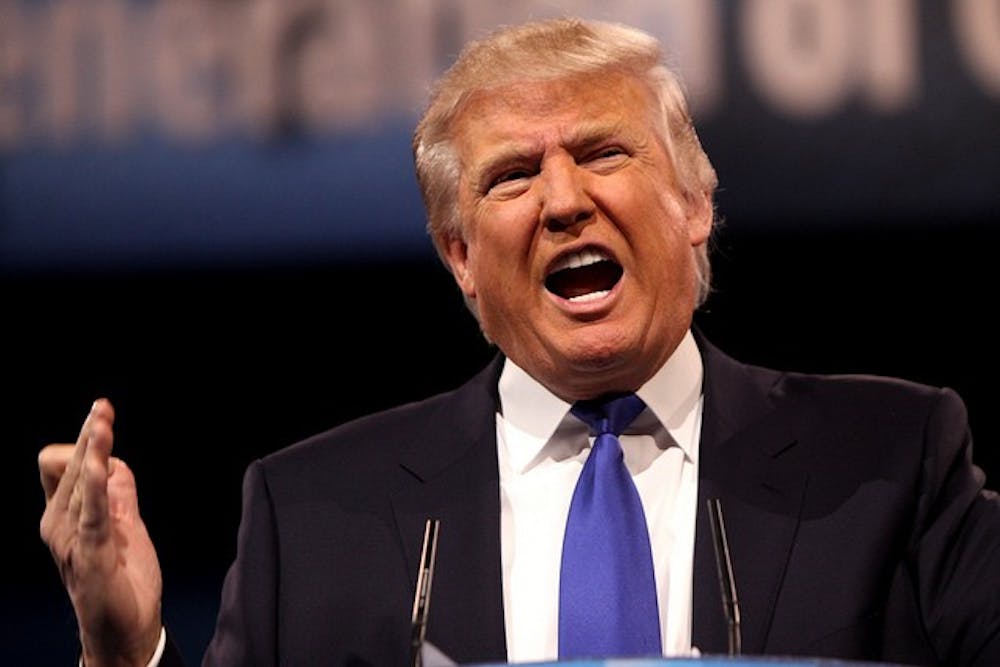President Trump formally recognized Jerusalem as the capital of Israel on Wednesday and announced plans to relocate the U.S. Embassy from Tel Aviv to the capital. The move is divorced from decades of domestic and international policy, evoking responses from the University community.
“Today we finally acknowledge the obvious. That Jerusalem is Israel’s capital,” Trump said during a speech in the Diplomatic Reception Room of the White House. “This is nothing more or less than a recognition of reality. It is also the right thing to do.”
The Jerusalem Embassy Act of 1995, which was passed to initiate and fund the relocation of the U.S. Embassy in Israel from Tel Aviv to Jerusalem, was not implemented under the last three administrations. Former U.S. Presidents Bill Clinton, George W. Bush, and Barack Obama exercised the law’s presidential waiver authority, refusing to move the Embassy and recognize the capital until peace talks were completed.
“After more than two decades of waivers, we are no closer to a lasting peace agreement between Israel and the Palestinians,” said Trump. “It would be folly to assume that repeating the exact same formula would now produce a different or better result.”
Trump’s decision was met with sharp criticism from around the world.
“He has now officially declared the U.S. to be well outside the international consensus on how to achieve a just and peacefully negotiated solution to the Palestinian-Israeli conflict, instead of pursuing diplomatic means by which the U.S. might have played a constructive role in urging Palestine and Israel towards the negotiating table,” explained Max Weiss, associate professor of history and Near Eastern studies at the University. “Trump has decided instead to throw his lots in with the unilateral and expansionist policies of right-wing political forces inside of Israel … and the U.S.”
“Jerusalem is a final status issue in the peace process,” said politics professor Amaney Jamal, who is also the director of the Mamdouha S. Bobst Center for Peace and Justice.
Trump’s decision to predetermine the final status of Jerusalem, outside the realm of the peace process and without making any mention as to what Jerusalem means to Palestinians, Muslims, and Christians in the region, raises the question of whether the peace process is essential in the first place, according to Jamal.
“If the final status issue of Jerusalem is already determined and Palestinians are not a part of the peace process or that outcome, it indicates … that the peace process is inconsequential right now,” she added.
The United States has never played the role of an honest broker during the peace process, according to Weiss. The United States, which contributes around $4 billion annually, is Israel’s biggest supporter. These record figures, institutionalized under the Obama administration, already hinder the peace process, according to Weiss. The United States’s “uncritical and unyielding military and financial support … ensures that a two-state solution has become unviable,” he said.
Weiss hopes that regional and international actors will do much more diplomatically to respect, recognize, and help achieve Palestinian aspirations for sovereignty and self-determination — specifically, diplomacy with the ends of terminating the Israeli occupation of the West Bank and the ongoing siege on the Gaza Strip. Additionally, the European Union could take a comparable action in recognizing Jerusalem as the Palestinian capital.
Rafi Lehmann ’20, a member of the Alliance for Jewish Progressives, said he is concerned about potential violent attacks in Jerusalem and disregard for the Palestinian claim to the city. Lehmann said he does not speak for AJP. He urges members of the Jewish community to realize “how dangerous this move is and voice their disapproval.”

Many international actors have done so already.
“Trump has unified the entire world against him and against his decision,” Jamal said. From U.S. allies in Europe and the Muslim world to U.S. enemies elsewhere, the world is united under the belief that the decision was ill-thought and counterproductive, “that it unravels decades of Middle East diplomacy in the region, and that it’s not in spirit of … the two-state solution and compromise that dictates international standards, international law on the conflict, and even U.S. foreign policy.”
“The decision taken [Dec. 6] is certainly a shameful one,” Weiss added, “although it is one that simply makes plain that the U.S. government’s position now and perhaps for decades … has been one that will support the interests of even the most extreme, expansionist, and annexationist elements on the right wing of the Israeli political spectrum.”
Not everyone is ready to criticize Trump so harshly.
“We applaud the U.S. government’s decision to recognize Jerusalem as the capital of the State of Israel after nearly 70 years,” wrote Morgan Bell ’19, president of Tigers for Israel, in a statement to The Daily Princetonian. TFI remains committed to a strong U.S.-Israel relationship, she added.
Bell is a former copy editor for the ‘Prince.’
“We hope this decision is a step towards peace for the Israeli and Palestinian peoples,” she wrote. “Recognizing the sensitivity of this issue, we hope to see all involved parties implement this policy in a thoughtful and respectful manner to achieve lasting peace and stability in Jerusalem and across the region."
“I am not a politician,” wrote Rabbi Eitan Webb, director of the Chabad House at the University, “but as a Rabbi and as a Jew I think it is important to note that every synagogue in the world is oriented so that it faces Jerusalem. It has been that way for thousands of years.” He referenced Rabbi Jonathan Sacks, who wrote in a statement that Jerusalem is mentioned more than 660 times in the Bible.
Jewish groups on campus remain divided on Trump’s decision. While some Jews, like Rabbi Sacks, support the recognition, many less religious Jews, such as Rabbi Rick Jacobs, president of the Union for Reform Judaism, have spoken out against it.








